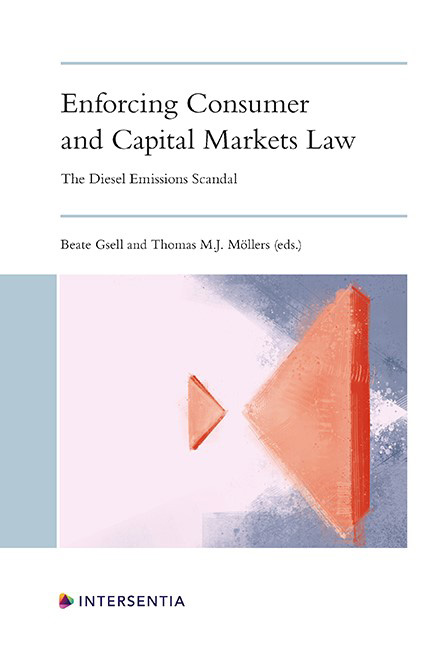Book contents
- Frontmatter
- Acknowledgement
- Contents
- List of Cases
- List of Abbreviations
- List of Contributors
- PART I INTRODUCTION
- PART II EUROPE
- PART II BEYOND EUROPE
- PART III THE SUPRANATIONAL PERSPECTIVE
- PART IV LEGAL PRACTICE PERSPECTIVE
- PART V INTRADISCIPLINARY ANALYSIS AND REFORM RECOMMENDATIONS
- Key Source Bibliography
- Index
- About the Editors
Enforcing Consumer Law in Austria
Published online by Cambridge University Press: 22 December 2020
- Frontmatter
- Acknowledgement
- Contents
- List of Cases
- List of Abbreviations
- List of Contributors
- PART I INTRODUCTION
- PART II EUROPE
- PART II BEYOND EUROPE
- PART III THE SUPRANATIONAL PERSPECTIVE
- PART IV LEGAL PRACTICE PERSPECTIVE
- PART V INTRADISCIPLINARY ANALYSIS AND REFORM RECOMMENDATIONS
- Key Source Bibliography
- Index
- About the Editors
Summary
INTRODUCTION
The European Union as well as Austria provides a relatively high level of consumer protection when it comes to substantive law and consumer rights. The greatest deficit that European as well as Austrian consumers are facing today consists in the lack of effective enforcement. A vast majority of consumers do not pursue their rights in court. Litigation is expensive, often (especially in typical consumer cases with relatively small amounts of dispute) economically irrational and time-consuming, even more so in cross-border cases. Most consumers simply lack the resources to enforce their rights in court individually.
A striking and painful reminder that access to justice is all too often limited to a small proportion of affected consumers, is the recent diesel emissions scandal. In the US, Volkswagen settled to compensate consumers (car buyers) only months after the scandal broke in September 2015 and weeks after dozens of class actions filed nationwide were centralised in the San Francisco federal court. More than four years later and despite a fairly evident violation of harmonised EU law, the difference to the situation in Europe could hardly be more extreme: Unfortunately, most EU Member States do not have a well-working system of collective redress. According to the Collective Redress Report, published by the European Commission in January 2018 following an extensive evaluation of the status quo, there are only five European countries which provide efficient collective redress procedures. As a result, most European consumers have not received compensation yet and consumer organisations struggle with different legal systems, different approaches to enforcement and insufficient enforcement tools and mechanisms. In Austria, Volkswagen has not even bothered to come to the table so far; cases are settled behind closed doors on an individual level as soon as and only if they offer the chance to reach the Supreme Courts in order to prevent precedent.
However, politically the scandal has had severe repercussions: following years of stagnation after the European Commission had issued its non-binding Recommendation on collective redress, it forcefully brought back the debate on collective redress in Europe.
- Type
- Chapter
- Information
- Enforcing Consumer and Capital Markets LawThe Diesel Emissions Scandal, pp. 13 - 28Publisher: IntersentiaPrint publication year: 2020



